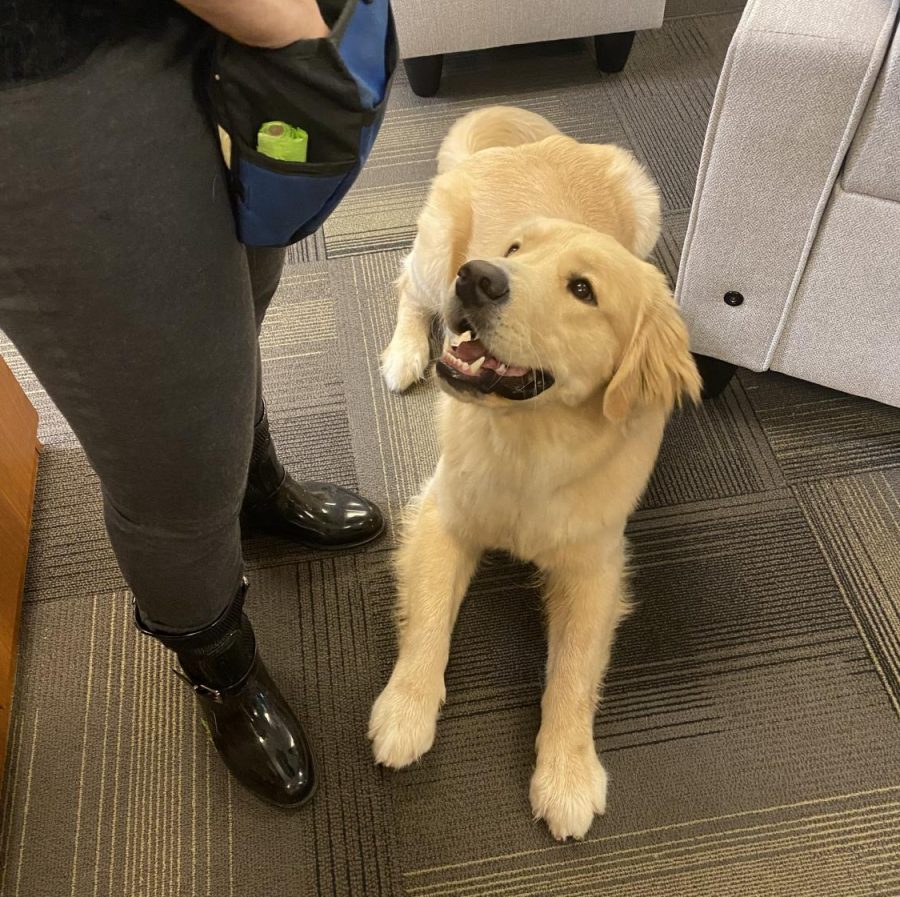Meet Tig: Oak View hall’s leader dog in training
Tig (pictured here) is training in the Leader Dogs for the Blind Program with Sheri Rourke, executive secretary of the Honors College.
There’s a new furry friend on campus, and his name is Tig. Sheri Rourke, executive secretary of the Honors College, is raising Tig to become a leader dog for the blind or visually impaired. She often brings him into the office for training.
Rourke is a first time participant in the Leader Dogs for the Blind Program. The non-profit, based in Rochester Hills, allows participants to raise and train a prospective seeing eye dog. To raise a leader dog, a mandatory three week training program at the organization’s headquarters is required. Rourke officially received Tig on Oct. 24, 2020. Since then, Tig has made frequent visits to Rourke’s workplace.
According to Rourke, bringing Tig into the office in Oak View Hall has benefits.
“I bring him into the office because it is an incredible learning experience for him,” Rourke said. “Not only does it help socialize him, but he learns to be in a different environment with a lot of distractions. It is important in the training of Leader Dogs that they ignore distractions and stay right next to their person at all times.”
An important part of raising a leader dog is taking them out in public. By bringing Tig to work, Rourke can practice proper car ride protocols and acclimatize Tig to busy locations.
Tig often socializes with Honors College students who pass through the office. Jessica Diller, a student at the Honors College was happily surprised to see Tig.
“I was pretty surprised to see a dog at the Honors College, because it’s something that is not typically around a school,” Diller said.
Tig was a pleasant surprise for Diller, who said, “he made my day, I posted him on my Snapchat story.”
Rourke enjoys seeing students interact with Tig.
“I love it when students come in to see Tig,” she said. “One of our students has learned how to walk him, and comes into the office to walk him a couple times a week. Other students come in to play or come in to get snuggles.”
Rourke did say while students are almost always fans of Tig, her coworkers sometimes view him as a distraction.
Rourke has thoroughly enjoyed raising Tig, especially his unique personality saying, “he is a loving dog. He is so sweet when he is not into things he shouldn’t be, or when he is not pulling me while walking. Tig is extremely strong. I have had 250 pound men have a hard time holding him back on a leash if he wants to go play with another dog. Other than that, he is silly and playful and super snuggly.”
Rourke has trained Tig to avoid some of his mischievous behaviors so he can be a professional partner for his potential match.
Tig’s tenure with Rourke ends on Nov. 28., when he will be returned. After he is returned, the organization will attempt to match Tig with a blind or visually impared person. Every year, the organization matches 200 leader dogs with clients, and one future contributor to that number might be an OU alumni.







